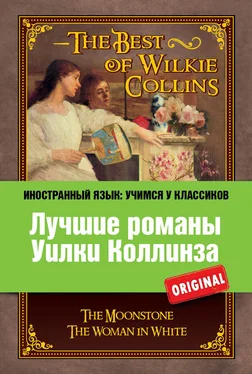“It means,” he answered, “that Miss Halcombe was strong enough yesterday morning to sit up and be dressed, and that she insisted on taking advantage of Fosco’s going to London to go there too.”
“To London!”
“Yes – on her way to Limmeridge.”
Lady Glyde turned and appealed to me.
“You saw Miss Halcombe last,” she said. “Tell me plainly, Mrs. Michelson, did you think she looked fit to travel?”
“Not in MY opinion, your ladyship.”
Sir Percival, on his side, instantly turned and appealed to me also.
“Before you went away,” he said, “did you, or did you not, tell the nurse that Miss Halcombe looked much stronger and better?”
“I certainly made the remark, Sir Percival.”
He addressed her ladyship again the moment I offered that reply.
“Set one of Mrs. Michelson’s opinions fairly against the other,” he said, “and try to be reasonable about a perfectly plain matter. If she had not been well enough to be moved do you think we should any of us have risked letting her go? She has got three competent people to look after her – Fosco and your aunt, and Mrs. Rubelle, who went away with them expressly for that purpose. They took a whole carriage yesterday, and made a bed for her on the seat in case she felt tired. To-day, Fosco and Mrs. Rubelle go on with her themselves to Cumberland.”
“Why does Marian go to Limmeridge and leave me here by myself?” said her ladyship, interrupting Sir Percival.
“Because your uncle won’t receive you till he has seen your sister first,” he replied. “Have you forgotten the letter he wrote to her at the beginning of her illness? It was shown to you, you read it yourself, and you ought to remember it.”
“I do remember it.”
“If you do, why should you be surprised at her leaving you? You want to be back at Limmeridge, and she has gone there to get your uncle’s leave for you on his own terms.”
Poor Lady Glyde’s eyes filled with tears.
“Marian never left me before,” she said, “without bidding me good-bye.”
“She would have bid you good-bye this time,” returned Sir Percival, “if she had not been afraid of herself and of you. She knew you would try to stop her, she knew you would distress her by crying. Do you want to make any more objections? If you do, you must come downstairs and ask questions in the dining-room. These worries upset me. I want a glass of wine.”
He left us suddenly.
His manner all through this strange conversation had been very unlike what it usually was. He seemed to be almost as nervous and fluttered, every now and then, as his lady herself. I should never have supposed that his health had been so delicate, or his composure so easy to upset.
I tried to prevail on Lady Glyde to go back to her room, but it was useless. She stopped in the passage, with the look of a woman whose mind was panic-stricken.
“Something has happened to my sister!” she said.
“Remember, my lady, what surprising energy there is in Miss Halcombe,” I suggested. “She might well make an effort which other ladies in her situation would be unfit for. I hope and believe there is nothing wrong – I do indeed.”
“I must follow Marian,” said her ladyship, with the same panic-stricken look. “I must go where she has gone, I must see that she is alive and well with my own eyes. Come! come down with me to Sir Percival.”
I hesitated, fearing that my presence might be considered an intrusion. I attempted to represent this to her ladyship, but she was deaf to me. She held my arm fast enough to force me to go downstairs with her, and she still clung to me with all the little strength she had at the moment when I opened the dining-room door.
Sir Percival was sitting at the table with a decanter of wine before him. He raised the glass to his lips as we went in and drained it at a draught. Seeing that he looked at me angrily when he put it down again, I attempted to make some apology for my accidental presence in the room.
“Do you suppose there are any secrets going on here?” he broke out suddenly; “there are none – there is nothing underhand, nothing kept from you or from any one.” After speaking those strange words loudly and sternly, he filled himself another glass of wine and asked Lady Glyde what she wanted of him.
“If my sister is fit to travel I am fit to travel” said her ladyship, with more firmness than she had yet shown. “I come to beg you will make allowances for my anxiety about Marian, and let me follow her at once by the afternoon train.”
“You must wait till to-morrow,” replied Sir Percival, “and then if you don’t hear to the contrary you can go. I don’t suppose you are at all likely to hear to the contrary, so I shall write to Fosco by to-night’s post.”
He said those last words holding his glass up to the light, and looking at the wine in it instead of at Lady Glyde. Indeed he never once looked at her throughout the conversation. Such a singular want of good breeding in a gentleman of his rank impressed me, I own, very painfully.
“Why should you write to Count Fosco?” she asked, in extreme surprise.
“To tell him to expect you by the midday train,” said Sir Percival. “He will meet you at the station when you get to London, and take you on to sleep at your aunt’s in St. John’s Wood.”
Lady Glyde’s hand began to tremble violently round my arm – why I could not imagine.
“There is no necessity for Count Fosco to meet me,” she said. “I would rather not stay in London to sleep.”
“You must. You can’t take the whole journey to Cumberland in one day. You must rest a night in London – and I don’t choose you to go by yourself to an hotel. Fosco made the offer to your uncle to give you house-room on the way down, and your uncle has accepted it. Here! here is a letter from him addressed to yourself. I ought to have sent it up this morning, but I forgot. Read it and see what Mr. Fairlie himself says to you.”
Lady Glyde looked at the letter for a moment and then placed it in my hands.
“Read it,” she said faintly. “I don’t know what is the matter with me. I can’t read it myself.”
It was a note of only four lines – so short and so careless that it quite struck me. If I remember correctly it contained no more than these words —
“Dearest Laura, Please come whenever you like. Break the journey by sleeping at your aunt’s house. Grieved to hear of dear Marian’s illness. Affectionately yours, Frederick Fairlie.”
“I would rather not go there – I would rather not stay a night in London,” said her ladyship, breaking out eagerly with those words before I had quite done reading the note, short as it was. “Don’t write to Count Fosco! Pray, pray don’t write to him!”
Sir Percival filled another glass from the decanter so awkwardly that he upset it and spilt all the wine over the table. “My sight seems to be failing me,” he muttered to himself, in an odd, muffled voice. He slowly set the glass up again, refilled it, and drained it once more at a draught. I began to fear, from his look and manner, that the wine was getting into his head.
“Pray don’t write to Count Fosco,” persisted Lady Glyde, more earnestly than ever.
“Why not, I should like to know?” cried Sir Percival, with a sudden burst of anger that startled us both. “Where can you stay more properly in London than at the place your uncle himself chooses for you – at your aunt’s house? Ask Mrs. Michelson.”
The arrangement proposed was so unquestionably the right and the proper one, that I could make no possible objection to it. Much as I sympathised with Lady Glyde in other respects, I could not sympathise with her in her unjust prejudices against Count Fosco. I never before met with any lady of her rank and station who was so lamentably narrow-minded on the subject of foreigners. Neither her uncle’s note nor Sir Percival’s increasing impatience seemed to have the least effect on her. She still objected to staying a night in London, she still implored her husband not to write to the Count.
Читать дальше
Конец ознакомительного отрывка
Купить книгу












